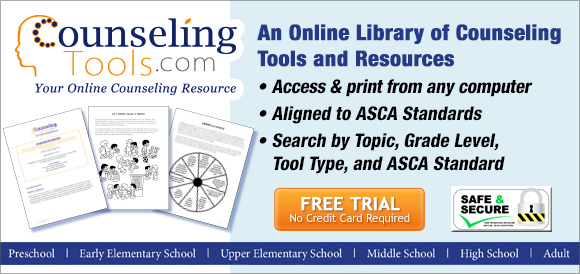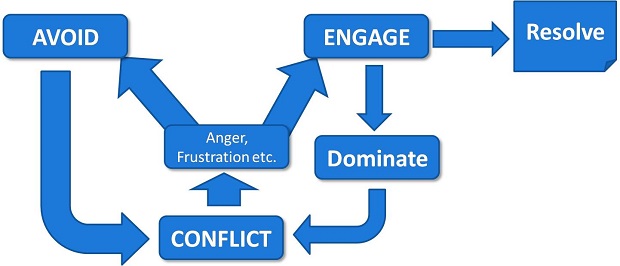Tips for effective conflict resolution in the home includes communication, listening, and ground rules. Many couples dealing with conflict end up screaming insults and hurtful words at each other, then storm away without ever addressing the actual issue. Not only is the original problem still unsolved, but now both partners are feeling angry at the way the other ‘persecuted’ them, frustrated that the issue wasn’t resolved, and perhaps distressed without any hope in sight.
 Partner conflict however can very often become a way of life, with each new argument –about different non-essential things – being spawned from a root problem that has never been addressed. This cycle continues to repeat itself, fueling deep anger and resentment until the couple either splits, or they learn conflict resolution techniques to apply to their situation, elevate their communication skills, and peel away each layer of grievance until the root problem is revealed and resolved.
Partner conflict however can very often become a way of life, with each new argument –about different non-essential things – being spawned from a root problem that has never been addressed. This cycle continues to repeat itself, fueling deep anger and resentment until the couple either splits, or they learn conflict resolution techniques to apply to their situation, elevate their communication skills, and peel away each layer of grievance until the root problem is revealed and resolved.
The cause and effect of conflict resolution however is the same whether it’s a top layer issue or one buried deep beneath many layers: a combination of good communication, mutual respect, mutual support, and remembering why you fell in love, moved in with, or married your partner in the first place. Positive memories are a powerful mediator.
The situation of a flare-up is often not where a couple’s anger is fuelled from, making the flare-up simply a symptom of a larger problem.
Take a Deep Breath
When one or both are angry, it is often a good idea to avoid the screaming and yelling until after each has had time alone to calm down, reflect and gather their respective thoughts. When a flare-up occurs just say “time out,” a previously (mutually) agreed to pause. While both may be heating up, nether will want to embolden the other as the one that broke an agreement they had already agreed to.
While this may alleviate outright fighting, it doesn’t address any issues. But the ability to halt outright aggression does set the stage for mutual conflict resolution.
It is human nature to assume that how one sees the world all other will share. Therefore when one partner clearly sees themselves in the right, they point out how their partner is in the wrong, usually followed by pointing out their flaws and weaknesses along the way, igniting the name-calling and blame-game cycle. However, while it lets people blow off steam, it remains a never-ending lose-lose scenario. Ask yourself, do you want to win the argument, or resolve the differences mutually and be happy. It may seem like a no-brainer, but you might be surprised how many people thrive on conflict, and they unconsciously want to fight.
Tips for Effective Conflict Resolution in the Home
Focus on Problem Solving through Understanding
While two people who stare at a wall a will likely report seeing the same colors, emotions and perception of actions are not as distinguishable. This plunges most conflicts into the grey zone that have many subtleties. It may help before conflict occurs to remember that “everyone is right from their perspective of the world.”
Thus, conflict resolution is not really about who is right and who is wrong; it is more about understanding the other person’s perceptions and feelings and coming to mutual understanding. You don’t have to agree with another’s view, but you should try to understand how they feel, and why that feel that way. If done mutually this is puts you on a path of resolving issues in a productive way.
Resolving relationship issues means that in the end both people feel satisfied with the result. There is no winner, only a win-win scenario.
Sure you might feel good ‘winning,’ if that were the objective, but no real problems will get solved by making the other person feel like a loser. On a related note, stay away from bringing up issues from the past, which are often used in tense relationships to serve as extra ammunition against the partner.
Listening Is a Learned Skill
Stephen R. Covey (the author of The 7 Habits of Highly Effective People: Powerful Lessons in Personal Change) was quoted as saying that “Most people do not listen with the intent to understand; they listen with the intent to reply.”
This tells us that we need to make an effort to listen, as deep listening to understand is not something inherent with all of us; most of us instinctively dig in to protect our belief, our opinion, position, and pride – s if recognizing that we’re not correct in assumptions is somehow a character fault. It’s not. As Simon Sinek pointed out on TED Talks, “There is a difference between listening and waiting for your turn to speak.”
During an argument emotions are high, egos on fire, and the parties are usually shouting over one other. This is the stereotype domestic argument. Highly unproductive, unhealthy, and scary to any kids in close proximity, it is the wrong path to a happy resolution.
As such, in a quieter moment, couples should set ground rules for the future. Come up with a truce word, like “Truce,” which lets each know that while they feel their emotions starting to heat up, they’ve already mutually agreed to walk away and calm down before having any discussions on the matter. This is by far easier said than done, but usually neither will want to be the one to break an agreement previously made and have that hanging over them. And this is an important step to getting to the space where resolution can be achieved.
How to Address the Matter at Hand
When the topic of the argument finally is addressed, it is important to listen to the other’s perspective, and understand how they “feel.” If one feels they’re being disrespected in public, for example, it doesn’t mean it’s so. But it also doesn’t mean that because it’s not so that this is genuinely not how they feel. Listen to what they are really saying, without getting caught up on specific words. Transcend the how, the what, and get to the why.
You might then mirror their statement in your response, for example, ‘it sounds like you’re feeling less appreciated as I forget to thank you for helping around the house.’ By responding in such a way you’re letting your partner know that you gave them the respect by listening while they spoke; that you heard what they said that you understood. This in turn will likely induce them to offer the same courtesy to listen without opinion when you respond.
Let your partner know how you feel and what you need from them — without guilt or manipulation. Encourage the same to be done to you. It might seem as obvious, but this is essential in building bonds, as well as showing each other you care. Communication is key to conflict resolution and you may be surprised by what such a discussion may reveal. You may be arguing about one point when your partner, in fact, is on an entirely different train of thought. Clarity is key.
Show support Repairs Broken Bridges
Being positive and giving your spouse credit for what has been done right shows them you appreciate their efforts, and are not trying to propagate the fight.
Be willing to compromise
An invaluable skill in all relationships is compromise – one cannot always get all of what they want, hence the word “partnership.” The goal is to each get some of what they want so that both can be happy and have their respective needs met.
Mining Deep for the Core Issue
Couples tend to have petty conflicts which are actually only a symptom of a larger issue. Work towards figuring out and resolving these issues which present themselves repeatedly, even if they present themselves in various forms.
But once the current issue is resolved, don’t stop there. Ask yourselves “why do we keep having these petty disagreements. Many times it suggests something that is left unsatisfied deep down. In many cases this can come down to how you each see the world, your place in it, and where you each want to get to.
If you are working towards remaining calm and withholding insults while your partner refuses to do so, the issue will never be rectified.
For more conflict resolution tips and methods, some of which you can teach your children, check out some of these resources:
Conflict Resolution Bingo
Conflict Resolution Problem Solving Cards
Cool, Confident Workbook
Peace Talks to resolve Conflict DVD
For counselors, get access to 1500+ forms,workbooks, scheduling and more

Originally posted 2015-07-22 15:57:44. Republished by Blog Post Promoter

